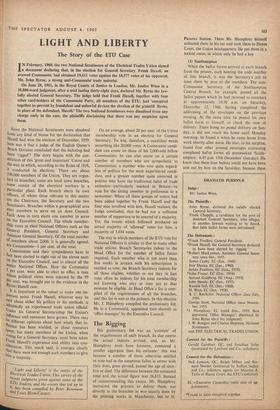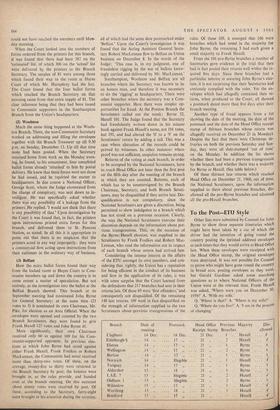The Rigging
His preliminary list was an 'estimate' of the requirements of each branch. In due course the actual indents arrived, and, as Mr. Humphrey must have foreseen, contained a smaller aggregate than his estimate: this was because a number of those otherwise entitled to vote had in the meantime fallen in arrear with their dues, gone abroad, passed the age of sixty- five or died. The difference between the estimated total and the actual figure was 26,833. Instead of countermanding this excess, Mr. Humphrey instructed the printers to deliver them, not directly to the branches as was usually done by the printing works in Manchester, but to St. Pancras Station. There Mr. Humphrey himself collected them in his car and took them to Hayes Court, the Union headquarters. He put them in a locked room, to which only he had a key.
(1) Southampton When the ballot forms arrived at each branch from the printer, each bearing the code number of that branch, it was the Secretary's job to issue them by post to the members. The non- Communist Secretary of the Southampton Central Branch, for example, posted all the ballot papers which he had received to members at approximately 10.30 a.m. on Saturday, December 12, 1960, having completed the addressing of the envelopes on the previous evening. At the same time he posted his own ballot form to himself, to check the time of delivery. There being no postal delivery on Sun- day, it did not reach his home until Monday morning: he found it when he came home from work shortly after noon. He also, to his surprise, found four other printed envelopes containing completed ballot forms all postmarked 'South- ampton: 6.45 p.m. 13th December' (Sunday). He knew that these four ballots could not have been sent out by him on the Saturday, because these could not have reached the members until Mon- day morning.
When the Court looked into the numbers of forms ordered from the printers for this branch, it' was found that there had been 387 on the `estimated' list, of which 306 on the 'actual' list were delivered by the printers to the Branch Secretary. The surplus of 81 were among those which found their way to the room at Hayes Court of which Mr. Humphrey had the key. The Court found that the four ballot forms which reached the Branch Secretary on that morning came from that extra supply of 81. The clear inference being that they had been issued to Communist supporters in the Southampton Branch from the Union's headquarters.
(2) Woolston Much the same thing happened at the Wools- ton Branch. There, the non-Communist Secretary worked on addressing and filling the envelopes together with the Branch Treasurer up till 9.50 p.m. on Sunday, December 13. Up till that time none had been posted. When the Secretary returned home from work on the Monday even- ing, he found, to his amazement, four completed ballot forms already 'returned' to him by postal delivery. He knew that these forms were not those he had issued, and he reported the matter to headquarters. In due course a National Officer, George Scott, whom the Judge exonerated from the charge of conspiracy, was sent down to in- vestigate. He was specifically asked whether there was any possibility of a leakage from the printers. He replied, 'I would not think that there is any possibility of that.' Upon investigation by the Court it was found that, in fact, the printers upon instructions printed extra forms for this branch, and delivered them 'to St. Pancras Station, as stated. In all this it is appropriate to point out that there is no suspicion that the printers acted in any way improperly : they were a commercial firm acting upon instructions from their customer in, the ordinary way of business.
(3) Belfast How the extra ballot forms found their way from the locked room at Hayes Court to Com- munist members up and down the country is to some extent a matter of speculation. But not entirely, as the investigation into the ballot at the Belfast Branch showed. This branch at its September meeting had nominated John Byrne for General Secretary; at the same time (23 votes to 3) it nominated its own Chairman, Mr. Pike, for election as an Area Official. When the envelopes were opened and counted by the two Branch Scrutineers, they were found to give Frank Haxell 127 votes and John Byrne 41.
More significantly, their own Chairman received only 60 as against 109 for his Com- munist-supported opponent. In previous elec- tions at which John Byrne had stood against either Frank Haxell, Frank Foulkes or Robert MacLennan, the Communists had never received more than thirty-two votes. Of these, on the average, twenty-five to thirty were returned to the Branch Secretary by post; the balance were brought in, as the rules provide, and handed over at the branch meeting. On this occasion about ninety votes were received by post. Of these, according to the Secretary, forty-eight were brought to his attention during the scrutiny, all of which had the same date postmarked under `Belfast.' Upon the Court's investigation it was found that the Acting Assistant General Secre- tary Robert MacLennan flew to Belfast on Union business on December 8. In the words of the Judge: 'This case is, in my judgment, one of fraudulent rigging by the use of ballots know- ingly carried and delivered by Mr. MacLennan.'
Southampton, Woolston and Belfast are all branches where the Secretary was known to be an honest man, and therefore it was necessary to do the 'rigging' at headquarters. There were other branches where the secretary was a Com- munist supporter. Here there were simpler op- portunities for fraud. At the Preston Branch the Scrutineers called out the result: Byrne 52, Haxell 101. The Judge found that the Secretary had fraudulently written down in his minute book against Frank Haxell's name, not 101 votes, but 191, and had altered the '0' to a '9' on the Scrutineers' return by adding a tail. This was a case where alteration of the records could be proved by witnesses. In other instances where proof was not sufficient, suspicion remains strong.
Returns of the voting at each branch; in order to be accepted by the National Scrutineers, have to reach Head Office not later than the first post on the fifth day after the meeting of the branch at which they are counted. Returns, each of which has to be countersigned by the Branch Chairman, Secretary, and both Branch Scruti- neers, may be disqualified if they arrive late. Dis- qualification is not compulsory, since the National Scrutineers are given a discretion, being permitted to show indulgence to a branch which has not erred on a previous occasion. Clearly, the way the National Scrutineers exercise their discretion depends on the information' about pre- vious transgressions. This, on the occasion 'of the Byrne/Haxell election, was supplied to the Scrutineers by Frank Foulkes and Robert Mac- Lennan, who read the information out in respect of each branch whose return had arrived late.
Considering the intense interest in the affairs of the. ETU amongst its own members, and con- sidering that, rightly, the Union has a reputation for being efficient in the conduct of its business and firm in the application of its rules, it was with some surprise that the Court learned from the defendants that 217 branches had sent in their returns late. Of these 69 were 'first offenders,' and consequently not disqualified. Of the remaining 148 late returns, 109 were in fact disqualified on the strength of information supplied to the two Scrutineers about previous transgressions of the rules. Of these 109, it emerged that 106 were branches which had voted in the majority for John Byrne; the remaining 3 had each given a small majority to Frank Haxell.
From the 106 pro-Byrne branches a number of Secretaries gave evidence at the trial that they had in fact posted their returns well within the re- quired five days. Since these branches had a particular interest in securing John Byrne's elec- tion, it is not surprising that their Secretaries had anxiously complied with the rules. Yet the en- velopes which had allegedly contained their re- turns, when produced to the Court, all showed a postmark dated more than five days after their branch meeting.
Another type of fraud appears from a list showing the date of the meeting, the date of the postmark and the date of the Head Office receipt stamp of thirteen branches whose return was allegedly received on December 21 (a Monday). Despite the fact that there were Christmas de- liveries on both the previous Saturday and Sun- day, they were all date-stamped `out of time' on' the Monday. In addition the list shows whether there had been a previous transgression by the branch, and whether there was a majority for Byrne or Haxell. (See table below.) Of these thirteen late returns which reached Head Office on December 21, 1960, out of time, the National Scrutineers, upon the information supplied to them about previous breaches, dis- allowed all the pro-Byrne branches and admitted all the pro-Haxell branches.



































 Previous page
Previous page